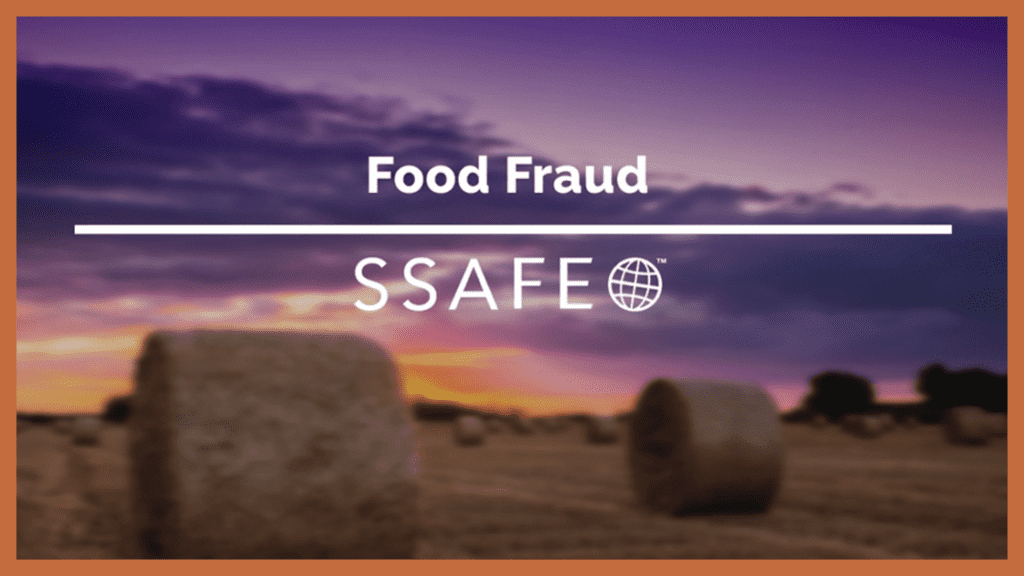Food crimes – including food fraud and food defense – are non-traditional food safety problems. I presented on food fraud prevention for this lecture series, but also watched every minute of the other presentations from this very experienced group.
Access the lecture series:
- Food Crime Prevention Masterclass (2021). Created by the SSAFE Organization with presentations by Dr. John Spink (MSU/ Food Fraud Prevention Academy), Dr. Chris Elliott (Queen’s University Belfast, Institute for Global Food Security), Dr. Wim Huisman (Vrije University of Amsterdam, School of Criminology), Jason Bashura (PepsiCo and formerly US FDA) and Neal Fredrickson (Cargill). The program was produced by the SSAFE Organization’s Executive Director, Quincy Lissaur. Link: https://www.ssafe-food.org/masterclasses/ssafe-lecture-series-in-food-crime-prevention
- Food Fraud Prevention Module (2021). Food Crime Prevention Masterclass, SSAFE Organization. Link: https://vimeo.com/showcase/foodfraud

The SSAFE Organization recently published their “Food Crime Prevention Masterclass” video series. This was a natural next step for SSAFE after they had published their Food Fraud Vulnerability Assessment Tool and the related Training Modules. (I co-created and co-presented these food fraud training modules with SSAFE Executive Director, Quincy Lissaur.) Food fraud is a sub-category under the broader food crime concept that includes food defense. Food fraud prevention and food defense are important concepts under food integrity.
From the presentations, a summary of the SSAFE terminology and definitions include:
- Food Crime: any crime that is committed using or on food.
- Food Criminology: the study of food crime focusing on understanding the root cause to identify efficient prevention.
- Food Defense: protecting against an act intending to harm public health, economy, or terror.
- Food Fraud Prevention: protecting against intentional deception for economic gain using food.
- Food Integrity: simply, using the EU/ EC definition, the condition that the food is what it says it is, including statements about safety, quality, and the source.
- Food Protection: is usually considered to include food fraud and food defense but also often includes food safety but not food quality or marketing claims.
(For more on the terms and definitions, see our article “International Survey of Food Fraud and Related Terminology” or the food fraud glossary.)
SSAFE is “a global non-profit membership organization that works to strengthen food safety and improve human, plant and animal health and wellbeing.” Their members include Cargill, The Coca-Cola Company, Compass, Danone, Givaudan, Kellogg, Kerry, Mars, McDonald’s, Nestlé, and Tyson.
From the SSAFE website:
- SSAFE has partnered with five leading experts to develop a free educational video series. Dr. John Spink, Dr. Chris Elliott, Dr. Wim Huisman, Jason Bashura, and Neal Fredrickson take us on a journey through the world of food fraud, food defense, and food integrity – what it is, what the issues are, what is being done, and what can be done in the future to help reduce and prevent food crime from occurring.
- Dr. Chris Elliott says, “The SSAFE Food Crime Prevention Series is the first of its kind, and I hope that both industry and government agencies will find the videos informative and helpful in combatting the growing menace of criminal activity in our global food system.”
Takeaway Points:
- Food fraud is closely related to other food crimes such as food defense incidents, or claims about quality and source.
- It’s helpful to take a moment to listen to subject matter experts discuss the application to some of your business problems.
- With the global geopolitical and economic pressures, food fraud and other food crimes are evolving, so this video series is a valuable foundation for insight.

